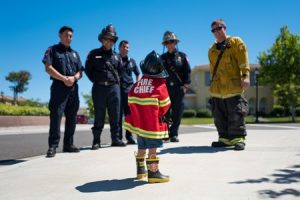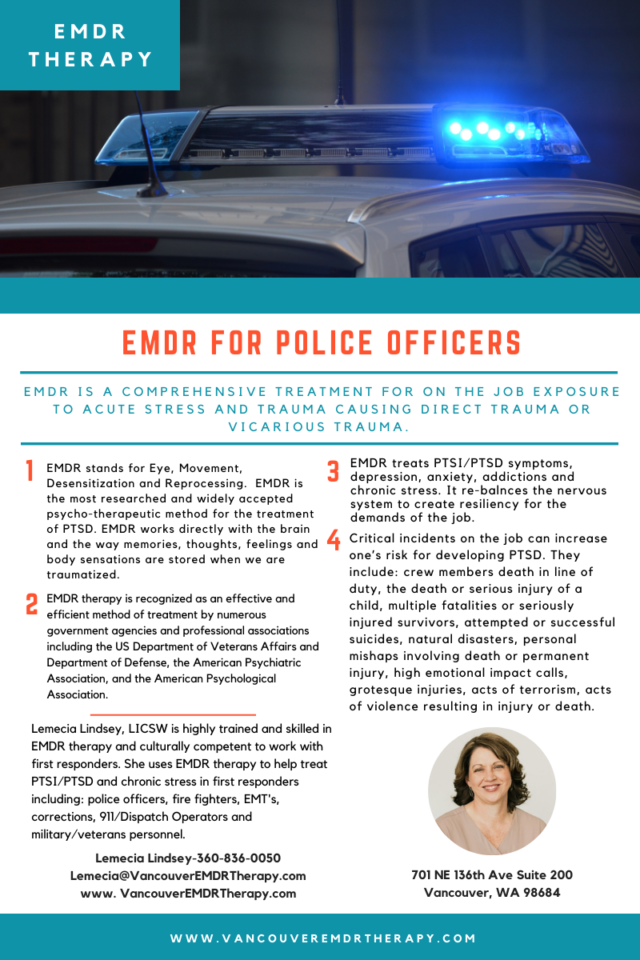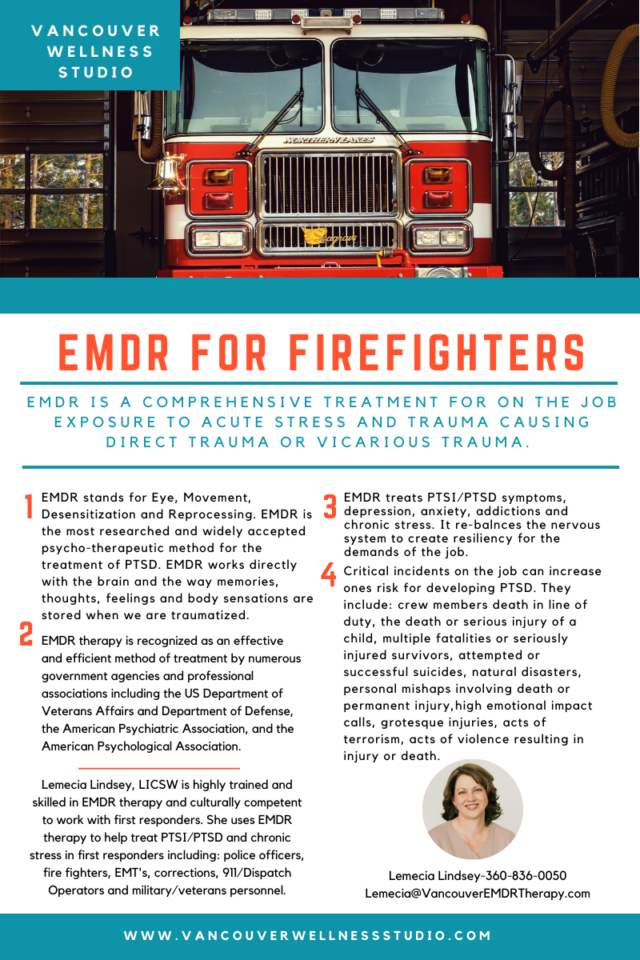We have over 10 years of experience using EMDR therapy to treat first responders, including; firefighters, those in law enforcement, paramedics, military personnel and healthcare workers. We are trained to provide Psychological First Aid to First Responders experiencing Post Traumatic Stress. We use a variety of EMDR protocols including, Recent Traumatic Events protocols and the Flash Technique to help reduce the distress of work stress and PTSD as well as other distressing life events.
Critical incidents at work can cause Acute Stress Disorder (ASD) lasting 2 to 30 days and Post traumatic Stress Disorder (PTSD) lasting more than 30 days. When first responders experience, witness, or are confronted with events on the job that involve death or serious injury, or a threat to the physical integrity of oneself or others a person responds with intense fear, helplessness, and horror. This can cause ASD and PTSD. First responders may constantly re-experience the traumatic memory and want to avoid situations associated with the event. They respond when triggered with a flight, fight, freeze response. First responders with Acute Stress Disorder or Post Traumatic Stress Disorder can experience greater difficulty doing their jobs effectively. These symptoms can make it not only difficult for first responders to do their work or be on active duty but it can also impact their lives at home with family, friends and in the community.
Besides helping First Responders heal from traumatic incidents on the job we also help them to address other important areas of their life such as; their relationships with spouses, significant others and family members as well as substance abuse issues, anger management, chronic pain and stress. In addition, due to the high correlations of unresolved trauma leading to PTSD for First Responders we help them to process unresolved memories of past traumas including childhood advertises. Besides EMDR therapy we may offer other holistic approaches to help First Responders including LENS Neurofeedback and Alpha-Stim.



 First responders are exposed to highly stressful events in the course of their routine duties. There are specific situations that increase one’s vulnerability to traumatic stress: having no control over the volume of calls; having to continue responding to calls after an especially disturbing call; the cumulative effects of being in the service for a long time; being in a helpless situation in the face of overwhelming demands, such as a prolonged, failed, rescue; having a partner or a peer killed or seriously injured in the line of duty; the suicide of a peer; being at serious risk of injury in the line of duty; witnessing horrifying things; experiencing the death of a child in the line of duty; responding to a call for a victim who is known to the responder; working without the support of administration, or having administration question one’s actions in an investigation. (
First responders are exposed to highly stressful events in the course of their routine duties. There are specific situations that increase one’s vulnerability to traumatic stress: having no control over the volume of calls; having to continue responding to calls after an especially disturbing call; the cumulative effects of being in the service for a long time; being in a helpless situation in the face of overwhelming demands, such as a prolonged, failed, rescue; having a partner or a peer killed or seriously injured in the line of duty; the suicide of a peer; being at serious risk of injury in the line of duty; witnessing horrifying things; experiencing the death of a child in the line of duty; responding to a call for a victim who is known to the responder; working without the support of administration, or having administration question one’s actions in an investigation. ( People who have experienced prior trauma are more vulnerable to PTSD than those who haven’t. This is significant for First Responders, who are constantly exposed to traumatic events. People exposed to trauma as children are at even greater risk for developing PTSD after a trauma in adulthood. There is some research indicating that females may be more vulnerable to PTSD than males. Experiencing a high level of physical and psychological hyper-arousal in the period immediately following a traumatic event may predispose a person to later PTSD. There is also evidence that experiencing dissociative symptoms and psychic numbing at the time of a traumatic event may put a person at increased risk for PTSD. Research has shown a connection between symptoms of depression in the initial weeks after the traumatic event as an indicator of increased risk for PTSD. Finally, experiencing Acute Stress Disorder predicts an increased risk for PTSD. (
People who have experienced prior trauma are more vulnerable to PTSD than those who haven’t. This is significant for First Responders, who are constantly exposed to traumatic events. People exposed to trauma as children are at even greater risk for developing PTSD after a trauma in adulthood. There is some research indicating that females may be more vulnerable to PTSD than males. Experiencing a high level of physical and psychological hyper-arousal in the period immediately following a traumatic event may predispose a person to later PTSD. There is also evidence that experiencing dissociative symptoms and psychic numbing at the time of a traumatic event may put a person at increased risk for PTSD. Research has shown a connection between symptoms of depression in the initial weeks after the traumatic event as an indicator of increased risk for PTSD. Finally, experiencing Acute Stress Disorder predicts an increased risk for PTSD. (
